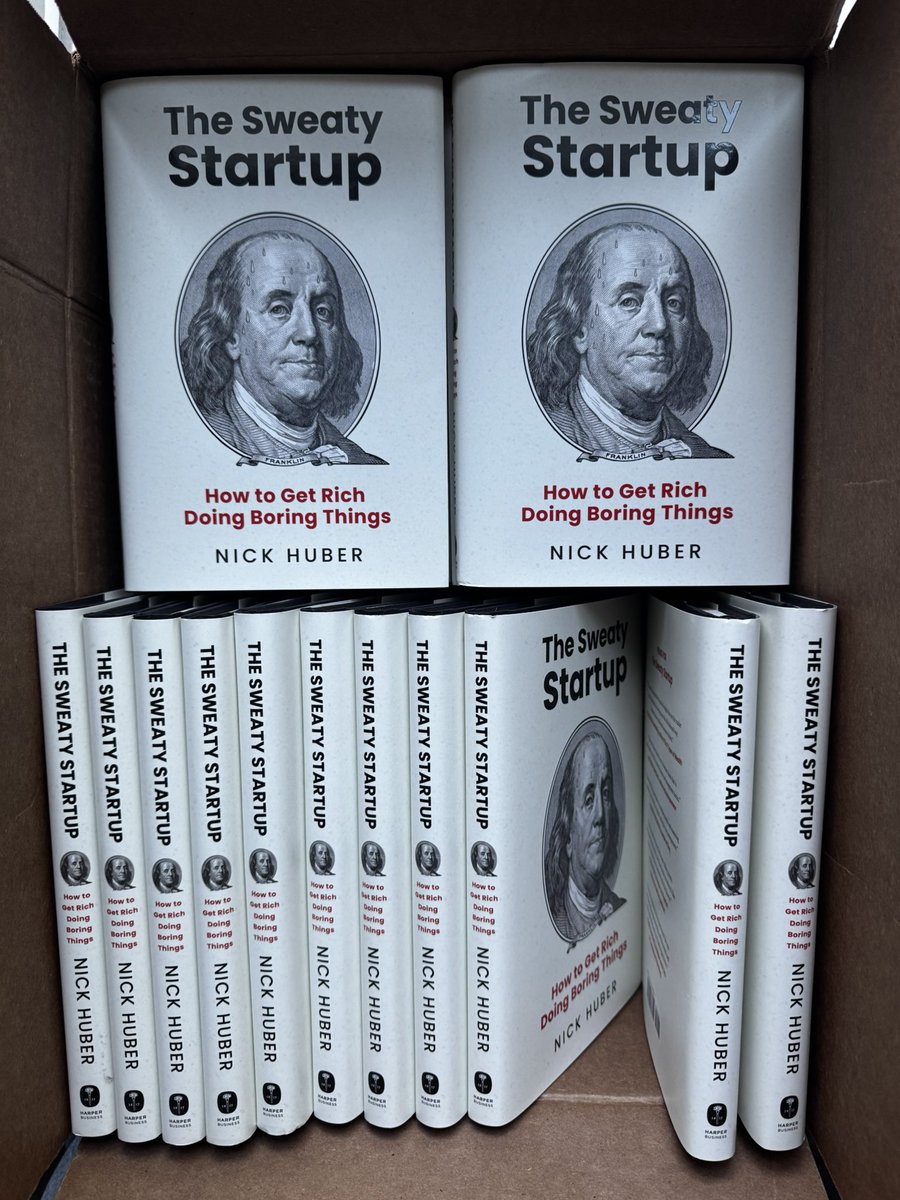Quick note:
I'm hosting a free CEO bootcamp with Shaan Puri this Wednesday at 2pm EST.
Register here and I'll send you a copy of the recording even if you can't join live.
--
How to start a business with very little money:
If you are broke, you need to start by trading your time for money. This means you need to focus on what I call a level 1 business.
All level 1 businesses require basically no capital, very low skills, no network, and they all have the ability for you to make $20-50/hr quickly.
My favorite level 1 businesses are where you move something, clean something, repair something, or provide some other manual labor in exchange for money.
Mowing lawns was how I started in high school. It put $40,000 in my pocket before I went to college.
It was uncomfortable, difficult, and sweaty but it got me started and was the stepping stone to my next business which made my partner and I our first million.
At first, I mowed the lawns myself, then I raised my prices and had enough capital to hire another kid from school to mow for me.
I would sell the contracts, he would mow some of the lawns, I would mow some, and we grew from there.
A lot of successful entrepreneurs I know purposely leave this information out of their biographies but almost all of them had a similar origin story.
They either got a job in a corporate setting and saved money before they started their first business or they started something really small and just did the work themselves until they had enough cash to hire.
Do not underestimate this path. 2-4 years of gritty manual service work can be the launchpad for you to build whatever you want. If you have no capital, network, or operational chops, this is how you should start.
Find your opportunity:
You should look for something where you can have a competitive advantage in one of three areas. Either speed, price or quality.
You want something with:
You should not need to steal customers from other companies to carve out your piece of the pie. Look for services that are in higher demand today than they were yesterday and are expected to be in higher demand tomorrow than they are today.
- An evergreen opportunity:
Remember, no matter what happens to the economy, grass isn’t going to stop growing. Pipes aren’t going to stop getting clogged. Heaters aren’t going to stop needing maintenance. Things are never going to stop getting dirty. Students will still keep going to college out of state and need storage. People always need haircuts. People need help moving things. People will keep getting married and weddings need photography, videography, and catering, etc. These industries are not going away. These are all great places to start.
Choose your competition wisely. Who do you want to compete with? Walmart? Amazon? Chinese manufacturers? Silicon Valley based companies? Big data? Big money? Coders or developers working for $7/hr on Upwork? A mom and pop with a fax machine, yellow page ads and a filing cabinet? You have to choose your competition. Don't compete with folks who are way out of your league.
Consider the trajectory of your service or product. Don't sell something that is getting cheaper all of the time. This has killed so many businesses and is putting a lot of strain on software development and app companies. The cost to produce some of these is trending lower each year. The cost to remodel your kitchen or install a new deck is only going up.
Avoid markets that are targets for hobbyists and dreamers. These people don't use common sense and make unwise financial decisions. You don't want to compete with them. This includes restaurants, bars, blockchain, personal training, health coaching, social media app development etc. These are big no-gos for me.
Create your list of 10 ideas:
Now, with all of this in mind, make a list of 10 possible services that you could offer. Use this list as your resource but don't be afraid to stray from it.
To help, answer these questions:
- What is unique about my location?
- What trends or changes may disrupt current businesses in my town?
- How is new, widely available technology influencing certain old school industries?
- How can I apply basic tech or new tools to an old school business to deliver it cheaper, faster or make it more convenient?
- What industries are way behind in digital marketing and online presence?
- What services are dominated by mom and pop shops?
- What services are hard for the general public or companies to find beyond word of mouth?
- What services are slowly delivered and have a large lead time?
- What is unique about my skillset?
- How quick do I need money coming in?
Now we form our list of services that we would like to analyze for possible opportunities. The first options will be low skilled, low upfront cost and low barrier to entry businesses. For example:
Some people say these are commodity services.
They say its a race to the bottom. This is simply not true.
It's only a race to the bottom if you try to compete on price. You can always find customers willing to pay a premium for the other two factors: speed and quality.
These businesses can help you make your first $100K or even $500K if you stick with it for several years.
If you already have some skills or you have a network, you can think about more specialized services that require more skill.
The next few businesses you should consider should be specialty niche services that only a few companies do but the customer pool is still relatively large.
Examples include:
The larger your city the more specific you can get here.
Remember, you don't need thousands of potential customers.
You can often create a viable escape from the rat race and even a scalable company with 20-50 monthly customers. Find a niche and focus on it.
The last opportunities you should look at would be high skilled opportunities.
These require significant training or investments in equipment but are still great opportunities:
Examples:
- Electrician
- Arborist
- Niche Carpentry (decks, offices, wine cellars, sound rooms, home bars)
- Kitchen or bathroom remodeling
I love these opportunities. There has been a massive shift away from labor intensive professions as more millennials opt to study marketing or liberal arts and less go to trade schools.
This space is great because the market is drastically growing, the competition is weak, nobody enters these professions because of passion and there is often a multi week lead time to get services like this signaling more demand than supply.
If you put systems in place and simplify the jobs for your employees and get the service to the consumer quickly you can name your price and build a great business.
Study the competition based on three factors
Now for each of your businesses you are going to study the three main companies in your city that offer these services based on the following criteria:
The most important factor by far. Call each company and act like a customer. How busy are they? How long would it take to get a quote and get service? Ask a ton of questions about their busy seasons, how many customers they service annually, etc.
- Accessibility / Digital Marketing
How hard is it to find the companies online? Are they buying Google adwords? Do they have any digital marketing at all? Do they have a social media presence? Online reviews? Is their business all word of mouth? What is their quality of customer service on the phone? Do they follow up with you? Do they try hard to get the sale?
How much are they charging for the service? An arborist might charge $800 to take down a tree that takes 2 guys 45 minutes.
Are the margins high or is it relatively affordable? Try to estimate the margins.
As you go through this process you will find holes. You will find areas you can provide the service better, faster or cheaper. That's your opportunity.
When you spot the value add and the problem you can solve its time to get serious about research.
Dive into industry trends on IBIS World. Study trends.google.com to analyze busy seasons, competitor size and search terms. Read everything you can read about the service. Study the companies that do the exact same thing in every major city in America.
There is a company out there that does what you want to do really well but they do it somewhere else. Perfect. Study them and model your business after them.
Naming your company and securing a good web domain is critical. Give my method a shot if you need some guidance here.
Build a pro forma financial projection model. Use it to estimate the monthly income and monthly expenses. Do a lot of research to properly estimate these costs.
Don't forget to pay someone $15 per hour it really costs you closer to $20 after payroll taxes and workers compensation.
Work to keep your overhead low:
Most businesses you can operate with very little in the way of equipment. If you need equipment purchase it on Craigslist. If you need a cargo van buy it for $10K off craigslist or rent one at first.
Here is my van buying guide. If you need equipment buy it used or lease it. Minimize your risk here.
Now its time to build your website and get your google my business location operational and get a few reviews on it. Here is my guide to get started quickly and cheaply.
A few things to keep in mind with all of this:
Be ready to sacrifice your free time and your hobbies in the near term. Be prepared to play the long game. Be prepared to put away your ego and work smart and hard for 3 years straight before the momentum really picks up.
Remember you will never find the perfect opportunity. There will always be reasons why you shouldn't do it. If it were easy everyone would succeed. You want it to be hard.
Check out the list of businesses I love and businesses I hate for inspiration.
I hope this helps.
--
A few tweets from this week:
--
--
--
--
P.S. I wrote my first book. It's coming 4/29/25.
I recorded the audiobook myself.
You can pre-order it here.
Onward and upward,
Nick Huber








.gif)

